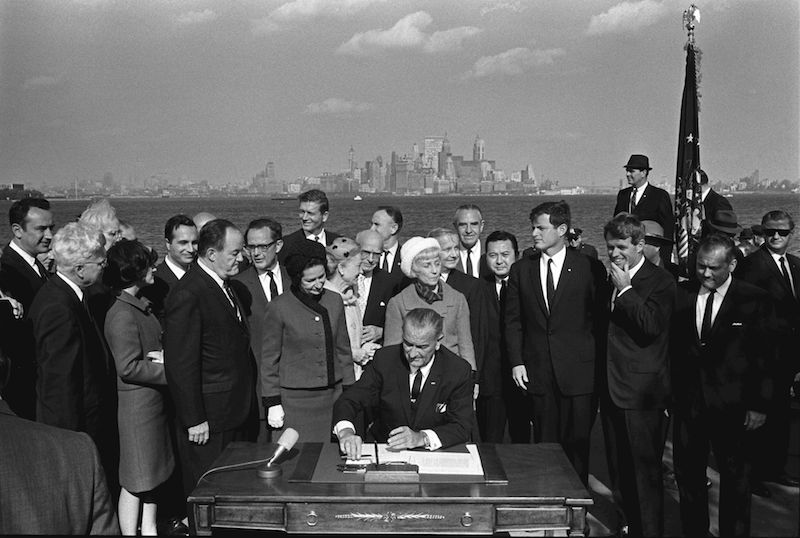The Compromise Over Immigration in 1965 that Is to Blame for Much of the Mess Today

Oscar Handlin (1915-2011) assumed a consequential role in the drafting of immigration reform legislation, beginning in the late 1940s.
The offspring of enterprising Russian Jewish immigrants who re-established their lives in Brooklyn and a professor of American history at Harvard University, his book, The Uprooted (1951) received a Pulitzer Prize.
We know from the scholarship of Roger Daniels, Mae M. Ngai, Reed Ueda, and Aristide R. Zolberg about Handlin’s roles as a vocal public intellectual and prodigious scholar. He took strong exception to the national origins quotas, codified in the immigration law of 1924. As well, he had provided expert testimony to a federal commission on immigration created by President Harry S Truman. Handlin also took strong exception to passage of the McCarran-Walter Immigration Act – which become law after Congress overrode Truman’s veto in 1952 – because it perpetuated quotas.
Oscar Handlin subsequently oversaw preparation of a series of pamphlets devoted to promoting cultural pluralism. One of them became A Nation of Immigrants by Senator John F. Kennedy. Arthur Mann, one of Handlin’s protégés – prepared an outline for Senator Kennedy. Surely Handlin figured into this arrangement. While Mann provided a helpful précis, once Kennedy agreed to the project he revised its focus, smoothing over sharp-edged themes and evoking a more uplifting and celebratory voice.
Less well know is the fact that just after Kennedy’s election to the United States Senate in 1952, he co-sponsored legislation – drafted by Senator Herbert H. Lehman – proposing to recast the nation’s immigration policy. Senator Kennedy subsequently would assume a supporting role in drafting the Refugee-Escapee Act (1957). Two years later he collaborated with Senators Hubert H. Humphrey and Philip A. Hart on the preparation of comprehensive immigration reform legislation.
After the death of President Kennedy, his brothers Robert and Edward acted to reissue A Nation of Immigrants. The revised and expanded edition, they contended, would improve the likelihood for passing what tortuously evolved into the Immigration Reform Act of 1965, with Senator Hart and Congressman Emanuel Celler as its principal co-sponsors. The revised book carried the Harper & Row imprint. Robert F. Kennedy’s introduction devoted some attention to East Asians, Mexicans, Puerto Ricans and African American civil rights.
The legislation, the Hart-Celler Act, passed in 1965. Oscar Handlin again gave expert testimony to Congress in support of the legislation. President Lyndon B. Johnson signed the Immigration Reform Act of 1965 in the shadow of the Statue of Liberty. Senator Robert F. Kennedy and Senator Edward M. Kennedy, among other political luminaries, participated in the well-staged ceremony.
The Compromise
In spite of Johnson’s much-celebrated capabilities for legislative logrolling, the new law lacked a key provision championed by President Kennedy. It entailed the design for a comprehensive Pan American immigration policy. But the longstanding coalition of conservative Southern Democrats aligned with the Republican minority struck it from the bill as the price of its support.
Senator Robert F. Bryd, vocal Democratic critic of the Hart-Celler Act, raised a pointed inquiry: "Why should the United States be the only advanced nation in the world today to develop a guilt complex concerning its immigration policies?" Senator Sam Ervin characterized the bill as "discrimination against the people who had first settled and shaped the country."
A half century later we understand that ramifications stemming from deletion of President Kennedy’s Pan American immigration provisions. As a result the new legislation prescribed restrictive exclusions for emigration in the Western Hemisphere. This still confounds national immigration policy, especially as it pertains to Mexico and its Central American neighbors. The baleful consequences – very much evident in the looming presidential campaign of 2016 – continuously have fueled embittered debates over our state-level and national immigration policies.
All of this reminds us that this quest, pursued by Oscar Handlin and John F. Kennedy, remains unfinished.
Words composed by Oscar Handlin add a poignant coda to this historical storyline.
On the very first page of The Uprooted he expressed a sensibility that enveloped his personal biography, his acclaimed scholarship, and his devotion to speaking beyond the academy in his role as a public intellectual: “Once I thought to write a history of the immigrants in America. Then I discovered that the immigrants were American history.”